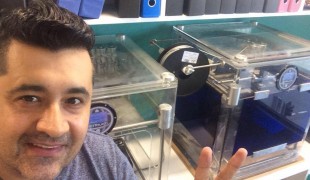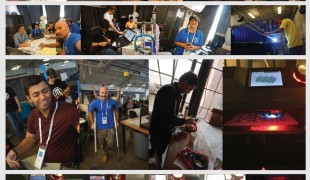- 4551
- 407
- 6
- 16
- 0
- Help Ukraine
About the solution
In 2013, Natasha was injured in a hit-and-run accident and lost part of her left leg below the knee. She wasn’t happy with her prosthesis visual.
“I wanted my symmetry back, I wanted something that flowed the design of my body and my natural design,” said Simpson. Rather than seeing her amputation has a disability, she chose to see it as a “negative space” that was now a part of her body, and that through her artistic vision, she could actively re-design. “It was very therapeutic for me.”
Simpson then connected with Gregor Ash, Director of the Institute for Applied Creativity at NSCAD, Michael Fanning, CEO of 3D Systems partner NovaCAD, and Kendall Joudrie, CEO of Thinking Robot Studios, an up and coming robotic design studio also from Nova Scotia. The team was given a veritable challenge: to custom engineer a leg that fit within just two weeks.
Once she was happy with the design, it was time to turn it into something functional. The engineering interns stepped up to help create an attachment system to attach the re-designed covers to the actual prosthetic. Next came the 3D printing.
Since the success of their prototype and final model, Simpson and Thinking Studios have been working to take their concept to market, with the aim of providing a range of prosthetics and prosthetic fairings to a mass audience, but customize to each person’s individual needs. Their goal is to sell it directly to the consumer, reducing costs and improving accessibility. Though no price has been mentioned, they do hope to bring their product to market soon.
Adapted from: http://bit.ly/2eUMeMB
What about you, do you have any solutions? Please share them with the Patient Innovation community!
https://www.youtube.com/watch?v=l200iQJFgww
This solution shall not include mention to the use of drugs, chemicals or biologicals (including food); invasive devices; offensive, commercial or inherently dangerous content. This solution was not medically validated. Proceed with caution! If you have any doubts, please consult with a health professional.
DISCLAIMER: This story was written by someone who is not the author of the solution, therefore please be advised that, although it was written with the utmost respect for the innovation and the innovator, there can be some incorrect statements. If you find any errors please contact the patient Innovation team via info@patient-innovation.com
-
-
393
-
0
-
5100

HU-GO - a 3D printed wheelchair
MOVING IN A WHEELCHAIR: Moving using a wheelchair.
Cervical spinal cord injury/Tetraplegia
3d Printed
Walking Aid (wheelchair/walker/crutches)
Restoring mobility
Promoting self-management
Promoting inclusivity and social integration
Maintaining Balance and Mobility
Preventing (Vaccination, Protection, Falls, Research/Mapping)
Neurology
Orthopedics
Rheumatology
Mobility issues
Solutions for Disabled people
Australia
-
-
-
544
-
0
-
9089

Father invents power wheelchair for his son
-
-
-
752
-
1
-
13667

Carry Crutches – Cup holder for people who use crutches
WALKING WITH A WALKING AID: Walking with a walking aid
(SELF)-CARE: DRINKING: Drinking independently.
3d Printed
Walking Aid (wheelchair/walker/crutches)
Promoting self-management
Promoting inclusivity and social integration
Maintaining Balance and Mobility
Preventing (Vaccination, Protection, Falls, Research/Mapping)
Internal Medicine
Neurology
Orthopedics
Rheumatology
Solutions for Disabled people
United States
-
 en
en